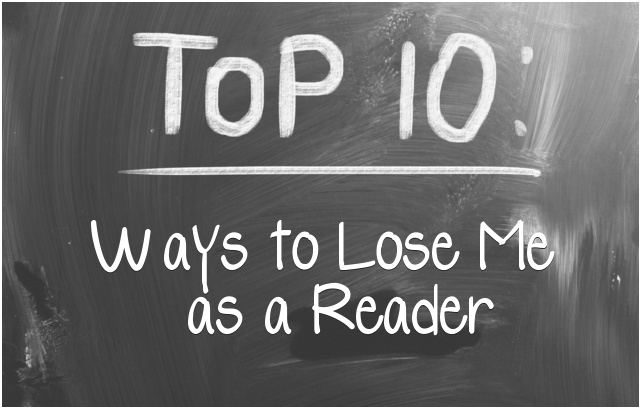
Once upon a time, I finished every book I started. Then, I realized that my time is more precious than that. And once I drop an author mid-book, with very few exceptions, I don’t usually pick them back up again. But here are some ways to lose me as a reader of romance.
I’m focusing specifically on romance since that’s mostly what I write and a lot of what I read. Also, these are in no particular order. I hate them all equally.
10.) Awkward Dialogue. If dialogue is consistently clunky, stilted unrealistic, or otherwise unfortunate, I’ll tap out. I know that sounds picky, but I read to escape into other worlds. But I can’t fully immerse myself in a story if the dialogue is bad.
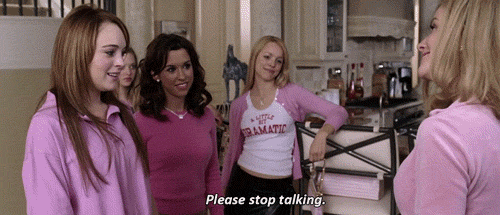
I did a dialogue presentation at my local writers group last summer and then uploaded it as a series of blog posts. If you’re interested in listening to me rant, you can find part one here.
9.) Too Stupid to Live (TSTL) Characters. This is a special breed of character. They’re especially prevalent in paranormal romance and romantic suspense, and even more frustrating, 99 times out of 100, the character is female. This is the character who proclaims herself to be strong, independent and self-sufficient. She can take care of herself, goddamn it. She’s also the target of a coven of angry witches/a pack of werewolves/a nest of vampires/a collection of mafia assassins/crooked cops or all of the above. The hero inevitably warns her that she shouldn’t leave the safe house/meet up with that sketchy sounding dude who says he’s got info on the real killer/go to Taco Bell. Our TSTL character does all of those things. Why? Because she needs to prove that she’s all kinds of independent, doesn’t need a man, etc. She doesn’t need a man. However, she does need is a fucking brain. Just because that advice came from a dude doesn’t mean that it’s categorically bad. Inevitably, the heroine goes out and does something dangerous because she’s got something to prove. And equally inevitably, she ends up needing the hero to rescue her. Prove your independence and ability to care for yourself some other way, and quit making stupid fucking choices.
Sometimes, characters take risks and go out in the middle of a witch-vamp-shifter-hitman-dirty cop-covered minefield. But it’s because the situation calls for it. If they don’t risk themselves something even worse could happen. But not to make a damn point.
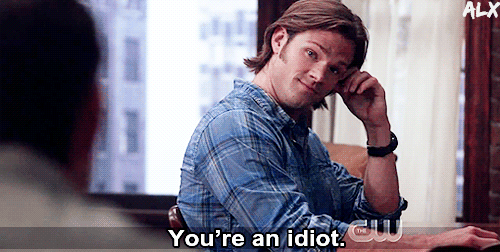
8.) Alphaholes. Why?! Why are these bag-of-dicks characters still a thing?! WHY are these “men” considered romance hero material?! Let’s looks at the alphaphole checklist: Bitter and jaded about women and love? Check. Misogynistic? Check. Self-absorbed and mostly concerned about matters of the dick? Check. Tortured past? Check. Manipulative as fuck? Check. Considers heroine his property which voids her ability to speak to other men ever, wear clothing/have occupation/hobbies/thoughts he doesn’t approve of? Check. Check. Check. And super check.
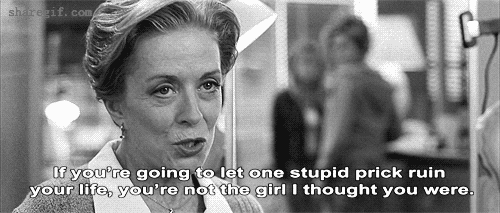
7.) Character Inconsistency. Now, I’m not saying that characters shouldn’t grow and change during the course of a story. That’s expected. Desirable, even. The thing I have a big old problem with is when a character is established in the beginning of a story begins acting utterly completely opposite to what’s been demonstrated as their personality. Certainly, there are things that will cause a person to react in a way that’s a little out of the norm. But when the characters personalities are like pendulums, swinging wildly out of control, from one extreme to the other, with absolutely no discernable reason for the seeming multiple personalities, I’ve gotta put that book down and back away.
I think I just had a bit of an epiphany as to why that happens, and if you’re still reading my rantiness, I’m about to share. I think that sometimes, the characters and the plot an author comes up with don’t mesh as well as the writer anticipated they would. And in an attempt to keep the plot going in the direction the author wants to, the characters are forced to react to each other/the environment/story events in a way that keeps their idea for the plot on track. The problem is, those characters are behaving in a way that’s utterly inconsistent with what’s already been written. The characters are basically being sacrificed for in order to adhere to the plot.
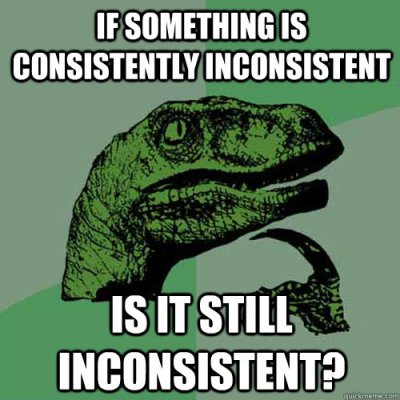
6.) Same Freaking Characters – Somewhat Different Plot. I think all writers have certain character types that they gravitate toward, and that’s cool. I know I do. I like writing academics or creative types – I have a lot of those. I’ve also written the occasional therapist, cop, sportsball player, carpenter, knight, barista, accountant, musician – oh, I guess that’s a creative type, DNR officer, business person, vampire hunter, priest, doctor, detective, god, librarian, costume director, well, you get the idea. There’s a lot of variety here. And I think their personalities are all pretty varied, too.
Now, I’m not talking about series here, but sometimes, it seems like authors get in ruts where all they write are characters who are billionaires. Or military or former military characters. Or professors. Or writers. Or some form or current or former law enforcement. Or a cowboys. Or fashion designers. Or psychics. Or librarians. Again, I’m not talking series. But just the same kinds of characters popping up over and over.
The same can be said of character types, too. All the guys are alpha and cocky. All the women are kickass, take no shit types. And there’s nothing wrong with any of those things, but if those are the only characters an author’s writing they can get a little stale after a while. Women are strong in myriad ways. Strength doesn’t always have to be about badassery.
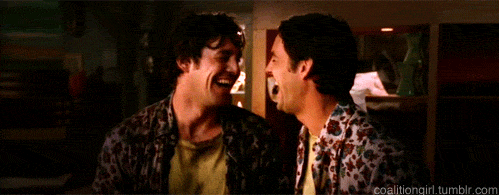
5.) Misandry Disguised as Feminism. And while I’m on the subject of strong women, I want to touch on feminism in romance for a minute. I fucking love seeing (and writing) feminist characters–both female and male (and gender nonconforming) in my fiction. But here’s something I don’t love. I don’t love when authors confuse or conflate feminism with misandry. While a feminist can certainly be a misandrist, they’re not always one and the same. There are some writers who consistently write female protagonists who constantly bitch about men who are lazy, stupid, juvenile, selfish, worthless, pretty to look at–but that’s about it. The characters in the books I’m thinking of aren’t talking about a specific man for whom these things might be true. These are sweeping generalizations leveled at all men, including the love interest. Sorry, but I’m not buying that HEA. Misandry is no better than misogyny, and I’m not here for any of it.
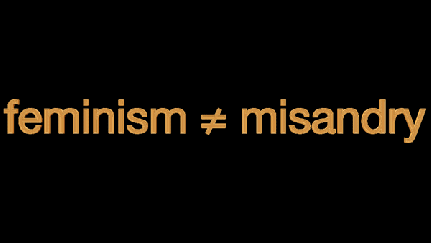
4.) Head Hopping. Head hopping makes me stabby. So. Very. Stabby. Pick a point of view and stay there for the scene. Or better yet, the chapter. If you’re switching mid-scene, you’d better have a damn good reason. If you’re writing a romance I want to know what the main characters are thinking in their separate scenes. If it’s important to know about his BFF’s feels, s/he can tell us, out loud with dialogue. Same for parents, taxi drivers, random relatives, coworkers, etc.
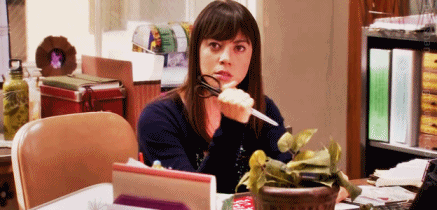
3.) Character Expectation vs. Reality. This falls under show don’t tell, and you see it most often with either character self description or description by the love interests. Often a character’s description of their love interest has no basis in reality. Like take Christian Grey’s description of Ana – brilliant, amazing, remarkable. NOPE. Sorry, Christian. There’s nothing in the text to support those descriptors. Ana is as boring, and honestly, not the brightest. I suppose you could say she’s remarkably weak-willed, but that’s about it.
Then there are the characters who self-describe as strong, independent women who love their jobs/hobbies/whatever and wouldn’t give them up for anything because whatever it is, is intrinsic to who they are as people. But, as soon as there’s interest from a man, all those things that were important to them? The very core of their personality? Gone. For the rest of the story, there’s no indication those traits were ever there.
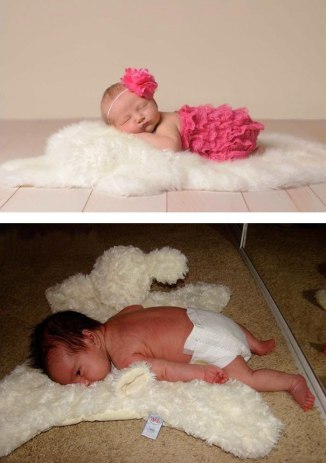
2.) Mostly Telling–Very Little Showing. When I was working as an acquisitions editor, I’d see a lot of manuscripts that relied on “telling” as their predominant narrative form. Don’t tell me that the airlock malfunctioned and everyone on the ship was terrified of getting sucked into the cold vacuum of space. Show me their fear – their cold sweat, the dude in the corner hyperventilating, burning up precious oxygen, and the woman who knocks him unconscious for the good of the many. Show me the tiny crack in the heavy tempered glass window, getting bigger and spiderwebbing faster and faster as it spreads across the surface making that ominous little tink-tink-tink-tink sound. Show me what’s happening so I can feel it.
This is an issue in all genres of fiction, but I find it especially problematic in romance. The author is asking the reader to take a journey with them–the journey of watching this couple (or grouping if it’s a ménage or poly novel) overcome their obstacles and fall in love. In order to do that effectively, the author needs to show us what the characters are feeling and experiencing. Don’t tell me he was more nervous than he’d ever been. Tell me that there were so many butterflies careening through his stomach, it lurched and for a second, he was afraid he was going to vomit as she answered the door.
It’s all in the details–and this goes for sweet romance as well as erotic. If the reader doesn’t see and understand what the character is feeling, there won’t be any connection with the characters. Don’t tell. Be like this little demon spawn and show.
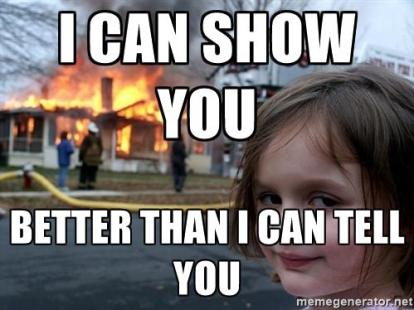
1.) Including Plot Elements Simply Because They’re Popular. This is when an author shoehorns in random things that really have nothing to do with the plot and don’t fit the characters at all. They just seem to be included in an attempt to boost sales. (Now, this may not be the case at all, but that’s how the stories read.) Examples of things I’ve see included in stories where they didn’t seem to belong and didn’t work at all with the narrative/plot/characters. Navy SEALS, over the top tragic backstories, BDSM, motorcycle clubs, stereotypical gay best friend, a stalker, sex clubs/dungeons, etc.
There are plenty of books where any of these elements work perfectly fine sometimes even together (just not all of them at once, please). But like anything else, any element included in hopes of boosting sales/popularity/visibility must be in tune with the characters and the rest of the plot.
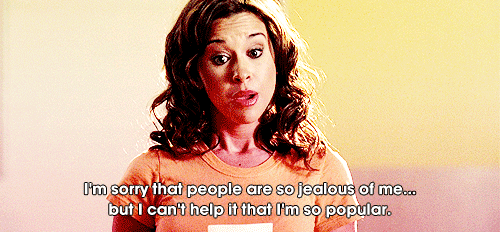
Be sure to check out the other bloggers’ lists to find out what makes them ditch books and authors. Jess, Kris, Gwen, and Deelylah.

Yes, yes so much yes!! I love Alphaholes. That totally cracked me up. And dialogue. I didn’t mention that. I wish people would read their dialogue out loud since, I hope, that would fix some of the biggest mistakes.
YES! Seriously, read it out loud. Get some software that has the computer read it to you. So much bad dialogue could be avoided that way!
I think you’re right about characters changing because they’re being forced to fit the plot. That was actually a huge problem I had with the first draft of TRatM – Faustina was SO tough and independent that it would have made more sense for her to, like, hit Benedetto over the head with something heavy, construct a raft out of dining chairs and sheer determination and GTFO, instead of sticking around to participate in the plot. So I sympathise with authors that happens to. I mean, you still have to rewrite and fix that stuff, but I sympathise…
It’s awesome that you recognized that. I think it can be hard to see that they’re acting against character when the plot is doing what you want it to.
Have you run into many professionally published books that have the POV change mid paragraph? I’ve read chapter changes but not mid?
Not necessarily mid-paragraph, but definitely mid-scene. And occasionally, there really does need to be a switch. But most of the time, it feels like the switch deflates the story tension.
This turned out to be a fantastic article about piyfalls writers can fall into. Great examples, and the images area great. Haha, the attempt at recreating the Anne Geddes baby on fur rug photo is hilarious!As a reader, my biggest reasons to DNF include character inconsistency and when inane, easily avoidable things happen just to conveniently drive the plot. That really bugs me.
Thanks so much! OMG that Anne Geddes one made me laugh so hard when I stumbled across it! Ugh – I forgot about convenient plot devices. Those bug me, too!
omg, your epiphany! That makes so much sense! I understand now.
And the pics of the babies (expectation vs reality)…about pissed myself. LMAO Perfect illustration. 🙂
That picture made me cry laugh when I found it!!!
Well done. I knew you’d go into great depth. Not disappointed. And great use of images. You are a rock star. I forgot about the whole adding plot elements. It’s also when people write a book just because that genre is popular, not because they had a story. More like that changed it to ‘fit’. Well done.
You know me…I can’t seem to not go off on a tear… 🙂
” witch-vamp-shifter-hitman-dirty cop”
Okay but this is probably the hero of some bad paranormal romance who is also an alphahole. The heroine is sassy and TSTL, so he constantly has to save her from certain death. She never got along with “other girls” because she’s not like them. There are ten books in the series.
HAHAHAHAHAHAHAHAHAAHAHAHAHAHAHAHAHAHAAHAHAHAHAHAHAHA
And I thank you for not letting me do this shit. Because all these things make me stabby, too…when I read it in others’ work.